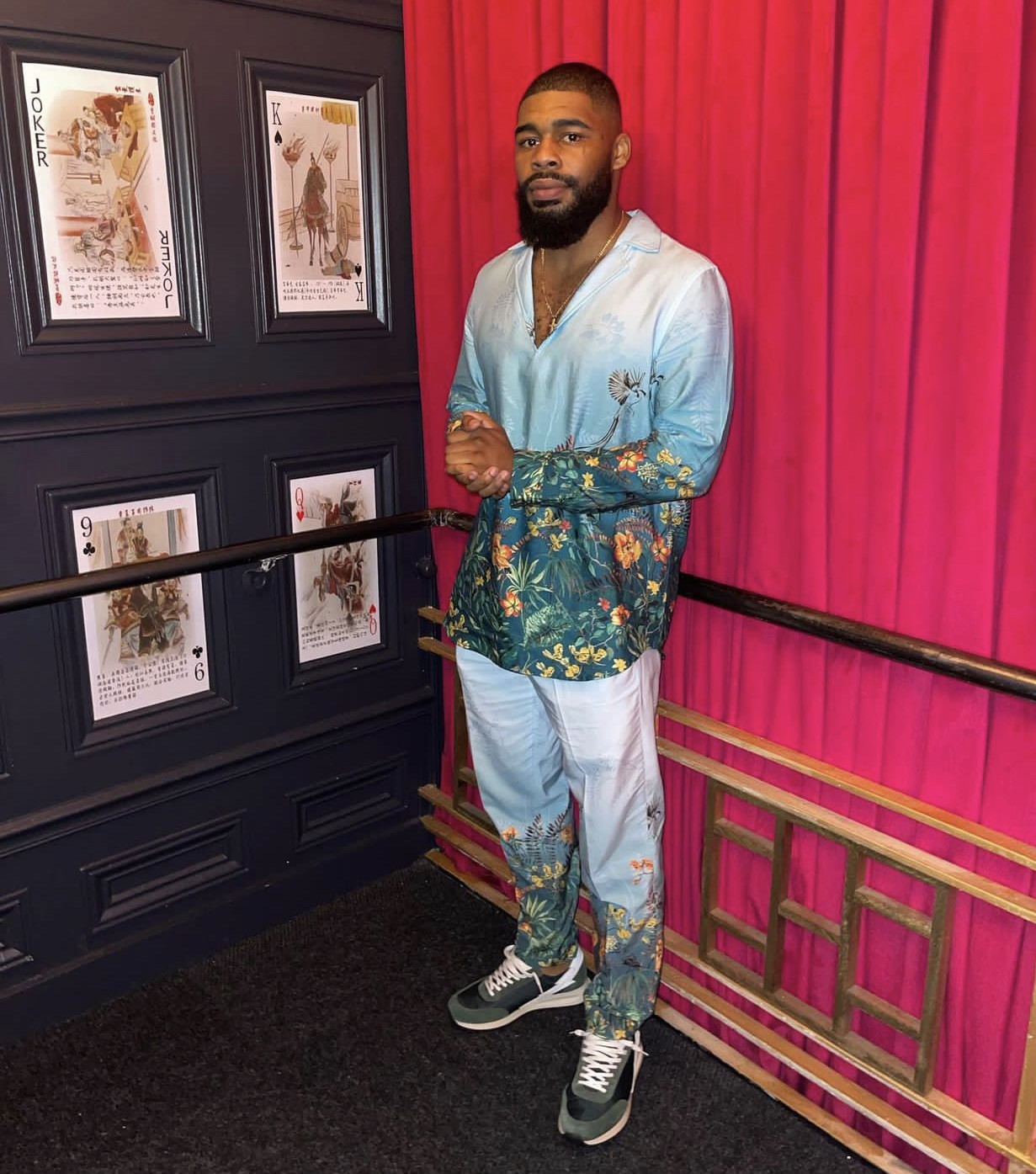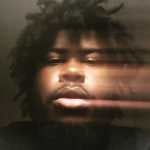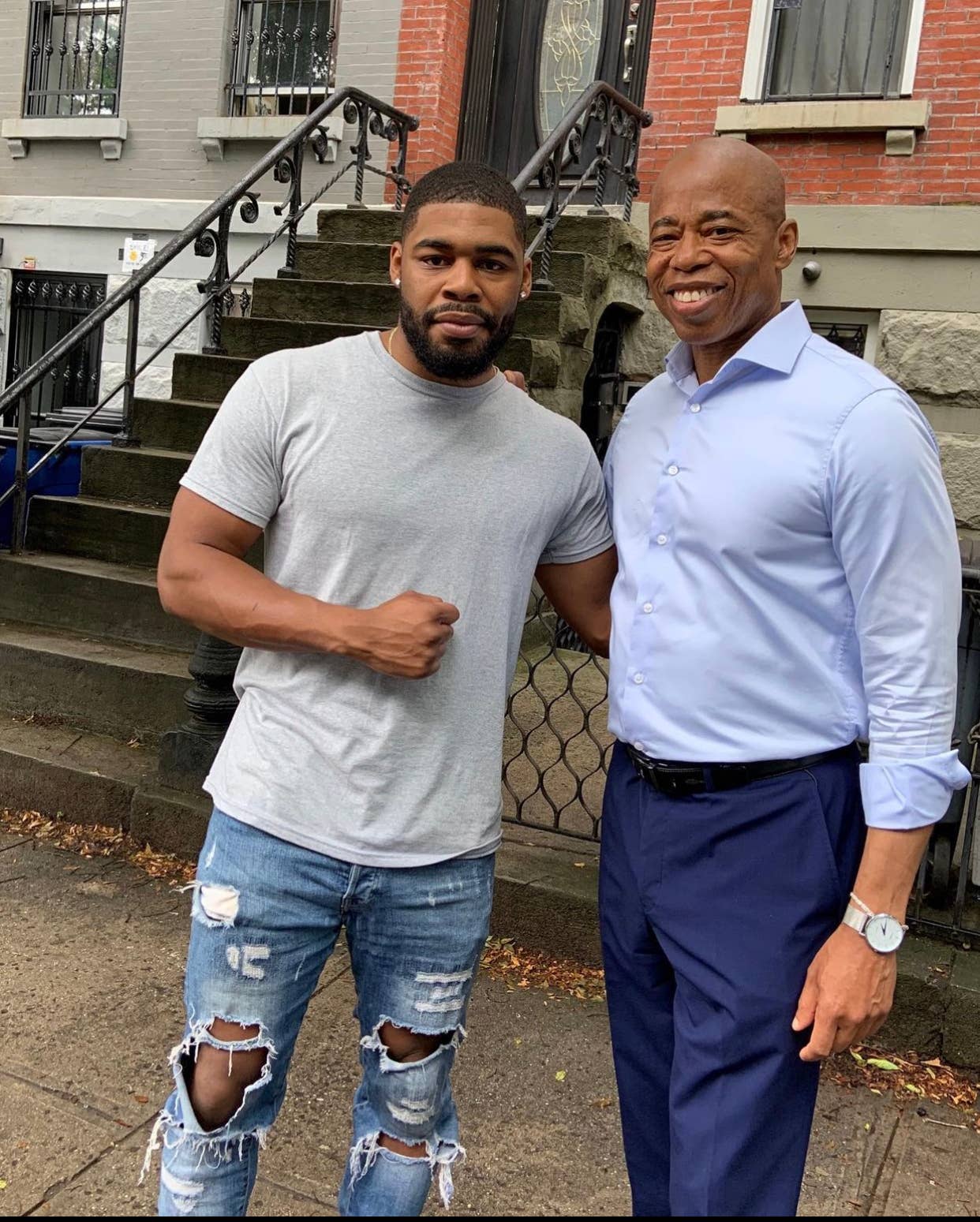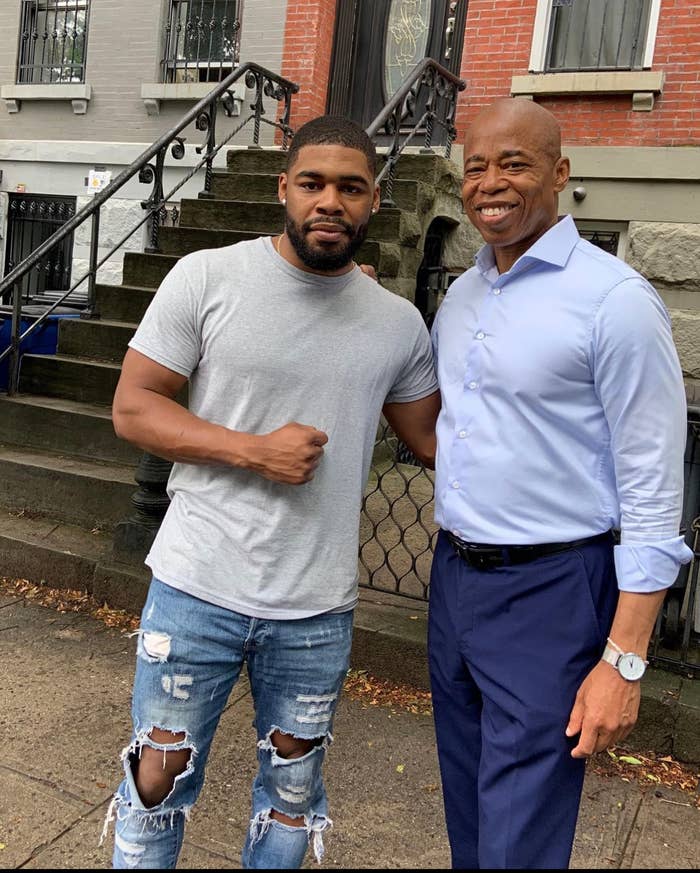
In February, New York City Mayor Eric Adams held a controversial press conference where he suggested a social media ban on drill music. Adams explained that his son Jordan Coleman sent him drill music videos, and what he saw was so “alarming” that he thought social media sites should remove the subgenre from their platforms.
The Mayor’s comments went national, sparking debates far beyond the New York Metropolitan area. But what’s less known is that Adams’ son Jordan is a rapper who goes by the name Jayoo. He’s released two albums (with another on the way) and he currently works at Roc Nation in the film department. The names of his projects are space-themed, but he raps from an everyman perspective reminiscent of J. Cole or early Drake, writing songs about trying to make it, as well as a fair share of boasts about his romantic conquests.
Coleman tells Complex that he sent Pop Smoke videos to his father after Adams had met with the late rapper’s family and wanted to know more about him. He says he texted Mayor Adams shortly after the press conference and told him: “Dad, you cannot speak for me. I have drill rappers on our label as clients, and I like drill music. You cannot ban a genre. And I’m not sure why you said what you said, but I disagree.” Coleman says Adams responded, “I understand what you’re saying, and you’re allowed to disagree. We come from different times.” Though Coleman spoke highly of Adams during our hour-long conversation, it seems they have fundamental differences in opinion on drill music.
The subgenre, created in Chicago, has become a convenient scapegoat for politicians all over the country looking to vilify rap as the reason for their city’s violent crime. In New York, drill artist’s aggressive lyrical depictions closely reflect a pandemic-influenced uptick in the city’s violent crime rate, but it’s not the cause of the violence. Poverty is, and it’s on state and city leaders like Adams to address those root causes of criminality.
While Coleman says he thinks it “makes sense” that Adams isn’t for “people who are committing crimes and then going and bragging about it on songs,” he doesn’t agree with banning drill music. He hopes that more meetings like February’s City Hall discussion between Adams and New York rap artists like Fivio Foreign, B-Lovee, and Maino will help “bridge the gap between the police and artists.”
Coleman vies to be a liaison between City Hall and the New York hip-hop scene as his rap career ascends, but at this point, he has no plans to get formally involved in his father’s administration, because he’s prioritizing his music and film endeavors. The 26-year-old has an extensive entertainment background. He started as a child model for the New York Daily News, where his mother worked as a reporter, before trying his hand at acting, with auditions for the 2008 film A Raisin In The Sun and the role of Drew on Everybody Hates Chris. Eventually he found success voicing Tyrone The Moose on The Backyardigans, which he says helped open doors for his Say It Loud film, which features stars like Kobe Bryant, Jadakiss, and Swizz Beatz talking about college.
“I decided to make a documentary about the importance of education for kids of color and it incorporated their favorite celebrities,” Coleman recalls. “[The celebrities] were speaking as if they went to college, or wished that they stayed in school.” In 2016, Coleman held a Ted Talk on “Steps To Success,” in conjunction with his alma mater American University. These days, Coleman works at Roc Nation as a creative coordinator for the film department, where he helps develop movie projects, while also pursuing his rap career.
We spoke with Coleman about his perspective of Mayor Adams’ stance on drill rap. Many people in the city are wondering what the future holds for New York rap during the Adams administration, and he has a better vantage point than most. The interview, edited and condensed for clarity, is below.
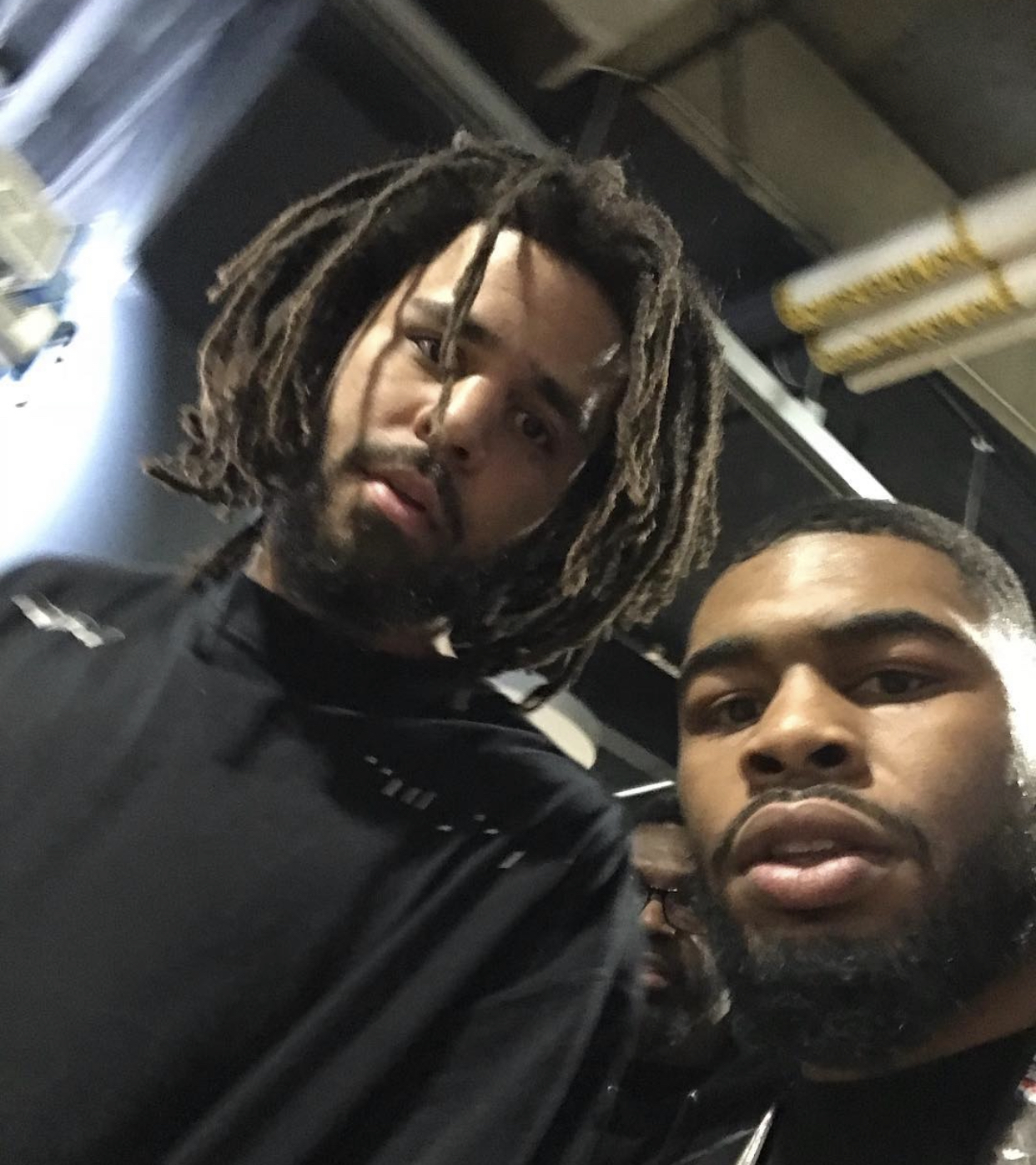
Were there moments where you tried to put him onto something and he was like, “I don’t want to hear that—turn that off?”
Yeah. My music. [Laughs.] No, I’m kidding. I wouldn’t say he would be like, “Turn that off.” But you could see that he would just check out of the conversation. Like if I’m playing someone’s song, he would just focus on his phone or ask questions and not really listen to it. It would just be one of those situations where it didn’t resonate with him as much as it resonated with me.
Lots of people in our age range have experiences like that, but it’s a different dynamic when your dad is the mayor. How often do you find yourself trying to clarify or explain things to him, especially when it comes to music?
All the time. The thing that I love is that he’s very curious, so he’ll ask questions and try to see if it makes sense to him logically, or if he likes the way things are going. But I’m definitely telling him about things, whether it’s clothing, lyrics and style, or just how they’re rapping, like the whole mumble rap scene. He has to understand that it’s a style people choose. There’s abstract art where people will throw paint on a canvas and then call it abstract. And then there’s mumble rap, and there’s other subgenres within hip-hop.
His version of hip-hop was a little bit different from what my version of hip-hop is today. I think Jay-Z had an interesting line, when he’s like, “Old folks, you need to stop acting like Tupac didn’t have the nose ring.” Because people have different styles within hip-hop, and it’s meant to be expressive. Just because they’re not expressive the way that you want them to be, doesn’t mean that it’s not expressive overall.
“Coming out saying that the drill scene is going to be banned is outrageous, because you can’t ban a genre of music—any kind of genre of music.”
Earlier this year, Mayor Adams held a press conference, and he mentioned that his son sent him some drill music videos, and he had an adverse reaction to that. What was the conversation that necessitated that, and how did that go?
It got taken out of context. This was around the time when he was asking about the whole Pop Smoke situation. My dad sat down with Pop Smoke’s parents when he was killed. And he was asking to get more information on who Pop Smoke was and what kind of music he made. So I showed him a couple music videos and songs, just in the nature of showing him what his element was like. Like, 50 Cent had this whole gangster rap and everybody else did, so it was no different for New York. That was the style in which New York embraced. So coming out saying that the drill scene is going to be banned is outrageous, because you can’t ban a genre of music—any kind of genre of music.
So I think once he said that and caught backlash for it, my dad really sat down and realized that some people really connect to this music. So you can’t take it away, just because you might not like it, or because there’s controversy behind it. Now, what he doesn’t like—and this makes total sense to me—are these people who are committing crimes and then going and bragging about it on songs, then being promoted on social media. Because as mayor of any city, you want your city to be safe, and you want people to have a good time in your city. You want people to come there, not to kill people, but to spend money and to enjoy themselves and create memories. So I think his focus was on the social media companies to not promote the bragging of killing one another, but it’s a tricky situation because that’s what that culture consists of.
I think the sit-down conversation [with other drill artists in February] was in the right direction. I feel like he started the movement in the right direction, but he needs to create a nice bridge between the artists who create that kind of music, so he can have a full understanding and be able to have a connection with the music. He needs to go about it in a proper way, where the artists respect what he’s saying and the civilians respect it as well. That’s a tough challenge, but that’s why he’s the mayor of New York City, because he’s built for those tough challenges.
So you specifically sent him Pop Smoke songs?
Yeah. He met with the family, and he was telling me the family was really nice and he had a great conversation with them. So he was asking, like, “What kind of music does he make?” Because I think this was his first introduction to the whole drill scene. And I said, “It’s hard to explain, but here are some of his songs.”
He was just showing his condolences, in the sense of a New York rapper being killed. So he wanted to show love and connect with them. Then he found out what kind of music it was and he felt bad that Pop Smoke was in a world that was so violent. I think as a parent he felt that part. He was like, “Yo, I know my son makes music and I hope he doesn’t have to live in a violent world like this.”
Were you at the meeting that he had with drill rappers?
No, I wasn’t. I was actually at work. I was at Roc and we had a late night that night, so I couldn’t get over to it. But I wanted to be there for sure, because I was interested to hear what people had to say. I was interested in what they’d say about my dad for one. And two, what they had to say about the subgenre of drill music.
Did he say he felt like it was a good conversation?
His energy was high after the conversation. He felt like it set a nice precedent moving forward for them being able to talk about it. I think the bill being passed about how they can no longer use lyrics to get people incriminated is going to be important. In the same light, we need to make sure that people are still not going out committing crimes and then bragging about it on records.
That’s a tough conversation because, like you referenced, drill culture is a consequence of systemic inequality, which spurs poverty, which spurs crime.
Right.
How do you feel about the notion that by coming down on these rappers, it’s censoring the music, and that censoring art doesn’t do any good for anybody?
We’re living in sensitive times right now, where censorship creates a backlash. And I think that it doesn’t create transparency. Right now, we need transparency. It’s something that could be spoken about in the mainstream or it should just be an underground genre. There’s plenty of genres, like heavy metal or different genres within the rock world, where it’s pretty demonic. Or it’s seen as if it’s really aggressive and they’re talking about killing and bleeding and all this other stuff, but it’s not the main genre on the billboards.
You hinted that he realized a ban on drill rap wasn’t the best solution after he had the conversation with rappers. Why do you think he had that realization?
I texted him and I was like, “Dad, you cannot speak for me. I have drill rappers on our label as clients, and I like drill music. You cannot ban a genre. And I’m not sure why you said what you said, but I disagree.” And he was like, “I understand what you’re saying, and you’re allowed to disagree. We come from different times.” And that’s what put everything in perspective for me, when he said that we come from different times. So he was just like, “Hey, I said what I said, and I’m going to own up to it. What I’m saying and what I’m doing might be two different things. But what I’m doing is the proper thing.”
He might feel some type of way, but once he sees the circumstances of the situation, he’ll make the proper decisions. And I think that goes unnoticed, because people don’t realize that he’s just a regular person. Sometimes he might say something and I’m not understanding the significance of it, but his actions will make sure that it’s amended. So I think there’s something to be understood by asking: Why is it popular? How is it popular? Who’s making it popular? And once you have that, you have to understand their motive and where their stories are coming from. It’s a trickle-down effect after that.
I think Fivio Foreign is very talented. I was listening to his last album. His storytelling is very vivid, and I would like to see more projects like this, because I know New York is capable of doing things of this nature. I could walk down the street and see someone rapping into a portable speaker with some roller skates on, a New York jersey on, they’ll be killing it. New York definitely has the talent. We just have to come together as a whole and make sure we’re representing our community to the fullest.
Some people have suggested that Mayor Adams doing things like going to a party with French Montana is a ploy to take away the stigma of his “tough-on-crime” policies. How do you feel about the notion that he’s using rap to distract from some of his policies that negatively impact Black communities?
First, shouts to French Montana, my brother, for sure. And second, he can’t please everybody with everything. The moment he understood that is when he officially became mayor. I know that he wants the best for the city, so there’s probably some things he’s doing that people don’t necessarily like, but it’s better for the overall. And I think that if people truly have a problem with it, then there needs to be a way in which they can voice their opinion instead of just yelling, or screaming, or thinking that it’s a distraction. My dad is a regular human being just like everyone else. Sometimes he does make mistakes and sometimes he does need someone to tell him that something isn’t correct.
But I will say that I don’t think he’s using the rap scene as a distraction. I think he generally likes being outside. Like I said, he’s a human being. He likes to party. He’s from New York. He’s a Brooklyn guy. Who wouldn’t want to go party? Especially if you’re the mayor of New York City, who wouldn’t want to go party in their city? I think he does it safely. I think he does it in a way in which people can connect. I mean, I feel like most people would love to see their mayor outside having a drink or just chatting it up and chilling in the club as if it’s all one big community. Because that’s all New York really is: one big community.
When he’s hanging out with these people, it’s not as if it’s a show. Like, French Montana really likes hanging out with my dad because he’s just a solid dude. And when you really get to talk to him, you see past the tie and the shiny shoes. You just see a guy who’s out here handling business and likes to have a drink on weekends.
Does he have those kinds of relationships with a lot of rappers?
Yeah, definitely. I mean it is New York City. New York City has a great relationship with rappers, so the mayor definitely should. We were with Nas the other day, and the way that he was able to connect with him as a New Yorker was powerful. It’s almost like you take off your cape or your superpowers and you just become a regular person with another legend. Seeing that unfold makes it all worth it. Or when he’s talking to Jay-Z about prison reform and they’re able to connect [and] you see two moguls collide, it is just powerful stuff to be a part of and to have visions for.
When I was in middle school, Barack Obama was the only Black guy you saw doing cool shit in the political world. You see him playing basketball, you see him with Pusha T, with J Cole and Hov going by the Oval Office. People of color need to see more situations like that. They need to see, like, “Yo, I don’t need to fit into your standards. I could be a cool politician, as long as I’m doing the things that I’m supposed to do and I’m staying appropriate. I could go out and have fun and keep my swagger.” Because that’s really what helped my dad become the mayor. He was able to have a swagger that propelled him past people who felt nervous in the limelight.
